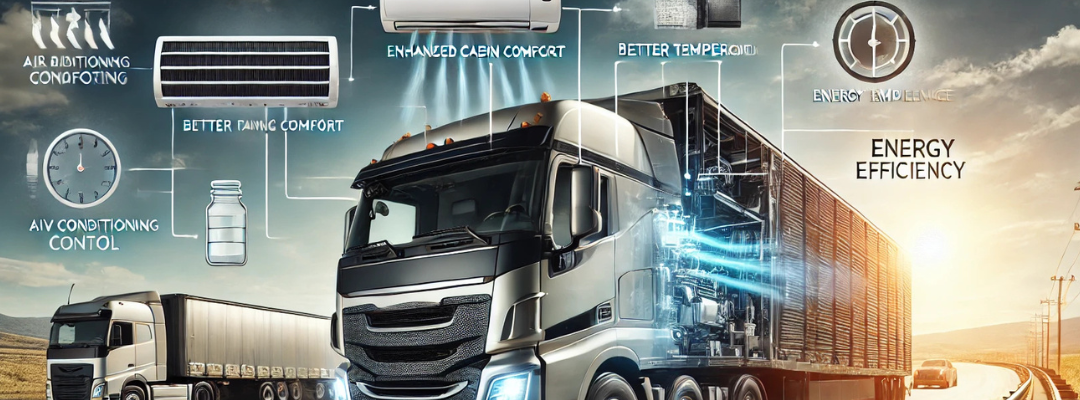Air conditioning (AC) units are essential for maintaining a comfortable environment in heavy vehicles, such as buses, construction machinery, and long-haul trucks. These vehicles operate for extended periods and often in extreme conditions, making efficient cooling systems crucial for both operator comfort and vehicle performance. Here’s a breakdown of the key aspects of AC units for heavy vehicles:
Types of Air Conditioning Units for Heavy Vehicles
- Engine-Driven AC Systems:
- Integrated with the Vehicle’s HVAC System: These are built-in systems powered by the vehicle’s engine. They provide cooling while the engine is running and are commonly used in heavy trucks, buses, and construction vehicles.
- Constant Cooling Performance: Suitable for long-term operations, engine-driven AC systems offer powerful cooling capabilities.
- Electric AC Systems:
- Battery-Powered AC Units: These systems run on battery packs or auxiliary power units (APUs), which allow for cooling without engine idling. Battery-powered units are particularly useful for reducing fuel consumption and complying with no-idling regulations.
- Solar-Powered Options: Some heavy vehicle AC units can be powered by solar panels, making them energy-efficient and environmentally friendly.
- Standalone or Portable AC Units:
- For Temporary Cooling Needs: These are portable units that can be used to cool the cab or cabin of heavy vehicles. They are typically smaller and less powerful but provide a convenient solution for short-term cooling needs.
Benefits of Air Conditioning Units for Heavy Vehicles
- Operator Comfort and Safety:
- In heavy vehicles, such as excavators, cranes, and bulldozers, operators often work in harsh environments. A comfortable, climate-controlled cabin improves the operator’s focus and reduces fatigue, enhancing productivity and safety.
- For buses and trucks, AC systems ensure comfort for both drivers and passengers, which is crucial during long-distance travel.
- Energy Efficiency:
- Modern air conditioning systems are designed to be energy-efficient, especially battery-operated units that run independently of the engine. This reduces fuel consumption, leading to cost savings, particularly for vehicles that operate in hot climates or for long hours.
- Reduced Engine Idling:
- Battery-powered and APU-driven AC systems allow heavy vehicles to be cooled without keeping the engine on, saving fuel and reducing wear on the engine. This is particularly important for long-haul trucks or buses that need to cool the cabin while stationary.
- Durability and Reliability:
- Air conditioning systems for heavy vehicles are built to withstand extreme conditions, such as high heat, dust, and vibrations. They are rugged and reliable, ensuring consistent performance in challenging environments, such as construction sites or long highway journeys.
- Fuel Savings:
- AC units powered by APUs or battery packs help save fuel by allowing the main engine to remain off while providing necessary cooling. This is especially beneficial in countries with strict anti-idling laws.
- Customizable Climate Control:
- Advanced AC systems for heavy vehicles often offer climate control features, allowing operators to set precise temperature and humidity levels, providing optimal comfort and air quality in the cabin.
- Improved Health and Well-Being:
- For operators of heavy vehicles, exposure to excessive heat can lead to health risks such as heat exhaustion. A well-functioning air conditioning system mitigates these risks by maintaining a cool and comfortable environment, reducing the likelihood of heat-related issues.
Key Features of Air Conditioning Units for Heavy Vehicles
- High-Capacity Cooling:
- AC units for heavy vehicles are designed to cool large spaces, such as bus cabins or the large cabs of construction equipment. They are engineered to provide consistent cooling in hot and harsh environments.
- 12V, 24V, or 48V Operation:
- Depending on the vehicle, air conditioning units are available in different voltage options, typically 12V, 24V, or 48V, to fit various heavy vehicle models and configurations.
- APU Integration:
- For heavy trucks and long-distance buses, AC units are often integrated with auxiliary power units (APUs), which run independently of the main engine, providing energy-efficient cooling.
- Multiple Fan Speeds and Cooling Modes:
- Adjustable fan speeds and cooling modes allow operators to control airflow and temperature based on their comfort needs and external weather conditions.
- Noise Reduction Features:
- Many heavy vehicle AC units are designed to operate quietly, minimizing cabin noise and allowing for a more comfortable and focused working environment.
- Ease of Maintenance:
- AC units for heavy vehicles are designed with easily accessible components and filters, making them simple to maintain and service, reducing downtime for repairs.
- Rugged Construction:
- Built to withstand the tough conditions of heavy vehicle use, these units are durable, shock-resistant, and able to handle continuous operation in dusty or vibration-prone environments.
Applications of Air Conditioning in Heavy Vehicles
- Construction and Mining Equipment:
- Air conditioning is essential for operators of bulldozers, excavators, cranes, and other large machinery that work in hot, dusty environments. Effective cooling increases operator efficiency and safety.
- Buses and Coaches:
- Passenger comfort is critical on long-distance bus trips. Air conditioning units in buses ensure a pleasant environment for passengers and drivers, reducing fatigue during extended journeys.
- Long-Haul Trucks:
- For long-distance truck drivers, air conditioning provides much-needed relief during rest stops or overnight stays. Battery-powered or APU-driven AC units offer cooling without requiring engine idling.
- Agricultural Equipment:
- Tractors, harvesters, and other large agricultural machinery benefit from air conditioning systems, especially during long hours of operation in fields exposed to direct sunlight.
Conclusion
Air conditioning units for heavy vehicles offer vital cooling solutions that improve comfort, efficiency, and safety for operators. Whether engine-driven or powered by auxiliary systems, these AC units are designed for durability and energy efficiency, making them an essential feature for heavy-duty operations. With options for integrated, portable, and battery-powered units, there are tailored solutions available to meet the unique needs of different heavy vehicles.

